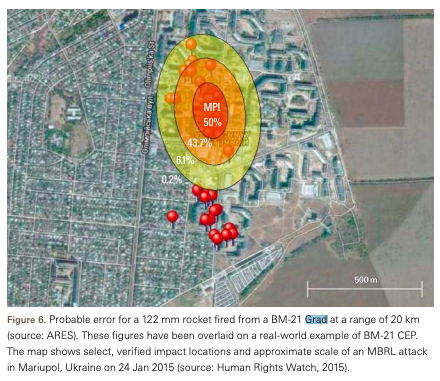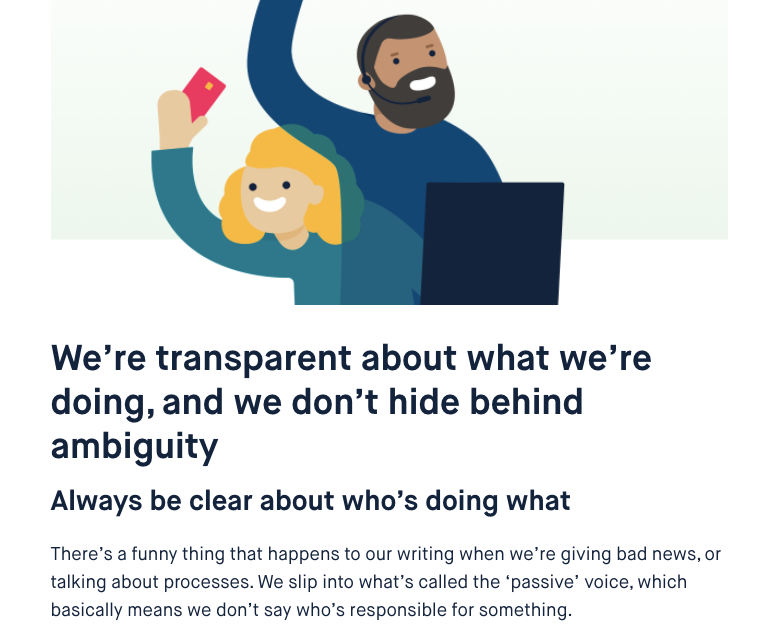sheer cloudy vagueness
the use of Grad rockets in Kharkiv
Today, in Kharkiv's suburbs, Russian rocket troops will be firing Grad rockets at the city centre.
You can read about the accuracy of these rockets here. They are not very accurate:
When firing a 122 mm BM-21 rocket at a range of 20 km, for example, a sample probable error in deflection is 160 m, and a sample probable error in range is 300 m, representing ideal conditions.

That's 11 acres of ''probable error'' in the best of weather. Besides palaces and stadiums, not many buildings span 11 acres. The five-storey Soviet flats that are all over the place in Ukrainian cities, the Khrushchyovka, tend to have a footprint of less than half an acre. The taller (now with lifts) twelve-storey Brezhnevkas are similar. It would take a gardened and courtyarded complex of about six apartment buildings to get us up to the 11 acre figure.
Whenever the Russian rocketeers aim at a target in a city - e.g., a checkpoint, a power substation, or a building with Ukranian troops in it - they do so knowing that many of the forty salvoed rockets will miss the target, rushing off to explode in the surrounding neighbourhood and potentially kill civilians.
You might say that the intention is to aim at a particular building, but the effect is to aim at a neighbourhood. That's a neat distinction, but it lets the soldiers who kill civilians wriggle themselves off the hook: "we didn't mean to hit the apartment building. We only meant to hit the military building". That can't be right. If the soldiers firing the Grads know about the weapon's inaccuracy (which they do), then they also know that it is impossible to aim at a single building. And with the single-building intention ruled out, you can't avoid the conclusion that the soldiers' intention in the first place was to aim at the civilian neighbourhood in which the military building stands. As Assad has been proving over the last ten years, the war crimes pile up with the rubble when these rockets are aimed at cities.
For some of the elderly residents of Kharkiv, this won't be the first time that they've witnessed artillery huddling around the city. It was German artillery in 1941 when the city was captured at the end of Barbarossa. And both Soviet and German artillery in 1943, a year in which control of the city changed three times (Soviets capture; Germans re-capture; Soviets re-capture). During WWII, the Kharkiv region was a burned-over district, ending the war with the grim honour of having been the only Soviet territory that had changed hands four times.
what does the 'special military operation' mean?
That Kharkiv's predicament evokes the sieges of the Second World War reveals the absurdity of the Russian state's description of the invasion as a "Special Military Operation" - a phrase that suggests turtlenecked Spetsnaz helicoptering in and out of the Donbas.
But revealing the absurdity of something is not the same thing as disproving it, and the phrase Special Military Operation is so greased up with vagueness that it is impossible to pin down. Of course, this is precisely the reason that the Russian state chose to use it. Everything that the Russian army does - withdrawing troops, adding troops, shelling civilians - can be explained to the Russian people by the boundless logic of the Special Military Operation. We all have a sense of what success looks like when it comes to wars, invasions, occupations, and regime change, but none of us know what a successful special military operation looks like. The ambiguity thus allows Putin to keep his options open.
If Orwell were here, he'd be pointing a bony finger at us and saying that Putin's vague language is an expression of a corrupt, totalitarian mind. He put the point like this in his 1946 essay, 'Politics and the English Language':
"In our time, political speech and writing are largely the defence of the indefensible. Things like the continuance of British rule in India, the Russian purges and deportations, the dropping of the atom bombs on Japan, can indeed be defended, but only by arguments which are too brutal for most people to face, and which do not square with the professed aims of political parties. Thus political language has to consist largely of euphemism, question-begging and sheer cloudy vagueness...Consider for instance some comfortable English professor defending Russian totalitarianism. He cannot say outright, ‘I believe in killing off your opponents when you can get good results by doing so' Probably, therefore, he will say something like this:
"While freely conceding that the Soviet régime exhibits certain features which the humanitarian may be inclined to deplore, we must, I think, agree that a certain curtailment of the right to political opposition is an unavoidable concomitant of transitional periods, and that the rigours which the Russian people have been called upon to undergo have been amply justified in the sphere of concrete achievement."
The inflated style is itself a kind of euphemism. A mass of Latin words falls upon the facts like soft snow, blurring the outlines and covering up all the details."
You see this weasel language of jargon, euphemism and vagueness all over the place - wherever people daren't say what they mean. The Stop the War lot that lay blame for the invasion on NATO "aggression" are guilty of it. The police forces and militaries who use words like "neutralise" are guilty of it. And companies, too, are guilty of it.
vagueness: the corporate jargon generator
I hope it's not too glib of me to segue from Ukraine to corporate communications, but I think that, through Orwell, there's a meaningful comparison to be made between Putin's Special Military Operation and the way that companies talk (I also should have at least some work-related content in this week's newsletter).
First, a rough outline of Orwell's argument from 'Politics and the English Language':
- Those who use plain English do so with a measure of bravery because they expose their ideas to scrutiny without hiding them behind vague language.
- Vague English (abstract and Latinate jargon, too many clauses, overworked imagery, the passive voice) is bad not just because it is clunky and difficult to read, but also because of the way it conceals sin. It makes "lies sound truthful and murder respectable".
How does this affect the way that businesses talk?
For rational consumers and investors, who don't want to be messed around, it's always better when companies communicate in plain English.
But for the company it's not always better to use plain English. It's only better to do so when you want your ideas exposed to scrutiny. If you want to keep something wrapped up and un-exposed, then the best thing to do is either (i) not talk about that thing or (ii) talk about it in such a vague and inscrutable way that you don't really talk about that thing.
daylight: Monzo's tone of voice guide
A company with a good communication strategy will use the plainest of English when they are proud of their product. See e.g. Monzo's tone of voice guide, which borrows the arguments and the style advice from Orwell's 'Politics and the English Language' essay:

¡No Passivelang!
darkness: Theranos
At the other grubbier end of the room, sit those companies that are hiding bad news. If they've taken the decision to lock up these scandals, then the best communication strategy is to keep quiet or to keep vague. Theranos comes to mind. See e.g., this recording of a conference call led by Elizabeth Holmes. It is utterly stuffed with jargon - words like "synergistically" are used unironically.
gloaming: vagueness as corporate strategy
There are other occasions when companies benefit, at least in the short run, from keeping things vague.
Sometimes, consumers don't want to read plain English. Owners of cryptocurrencies, for instance, delight in the incomprehensible jargon, which adds both a sense of mystery and a sense of the future to the technology.
Vagueness also buys time and builds coalitions. Putin's "Special Military Operation" does both of these things. The phrase leaves room for the objectives of the war to be publicly defined at a later date, and it is also so vague as to be palatable to a large number of Russian citizens.
Corporate messaging about ESG and identity politics also falls within this time-buying and coalition-building category. Often, younger employees want their employers to take drastic action on matters of climate change, anti-racism, and mental health. But the older cohort in leadership positions don't want to take such action. And so a compromise is struck where a given company (i) reassures the younger employees that it cares about anti-racism, climate change, and wellbeing, and (ii) promises a number of small actions on such matters.
If the company were to speak openly and in plain English about the action that it is promising, it would be criticised for its limp efforts by activists from within and without. So, the company speaks vaguely and loudly. The HR (internally) and marketing/comms (externally) departments get to work churning out statements about the company's commitment to battling racism, climate change and mental ill health that "consist largely of euphemism, question-begging and sheer cloudy vagueness".
Just as nonsense clauses in a contract often embody a late-night compromise between two negotiating parties, so too do vague corporate statements about far off net zero commitments and "bringing your whole self to work" hint at an uneasy peace within a company.
empty promises
Compromises arrived at through vague language are hollow ones. In companies, the vague statement-making gives the appearance of real action on race, mental health, and climate. Expectations are raised, but reality never catches up. And eventually something will happen to an employee that gives them a sudden moment of clarity: they realise that things haven't really changed as much as HR have been saying.
Here's an example from one of my interviews. This is a management consultant who, at a company training day, shared her experience of dealing with a misogynistic client. She didn't get the reaction from her colleagues that she was hoping for:
"I shared a story about how when I was running a workshop, and I was the only female in the room and the rest of them were all middle aged white men... one specific guy kept making some derogatory comments about women... and I was saying [at the training day], "I don't know, maybe it did bother me, and maybe I should have said something to the guy immediately..." And then I had comments from people more senior than me [colleagues] saying, "it's tricky, that, because he's a client, and you don't want to cause any friction between the client and that could potentially cause detriment to any future contract, blah, blah, blah." That was the exact example where they say, "zero tolerance", and they say, "bring your whole self to work and blah, blah, blah"... but then, "the client is paying for us. You don't want to get on his bad side. You don't want to upset him."
It really annoys employees. They feel betrayed, and why wouldn't they? The company is (vaguely) saying one thing and doing another.
what's the lesson here?
The lesson (though perhaps it's more of a hope than a rule) is for leaders of companies or pariah states: when you use language tricks for political ends, you widen the gap between expectations and reality among those that you lead. And the more you widen this gap, the more likely you are to fall into it.
If you've enjoyed this newsletter, please forward it on.
And if you aren't yet subscribed, please subscribe to receive the weekly newsletter. Thanks.